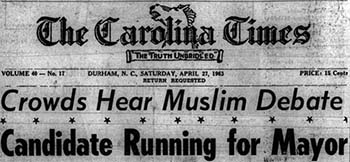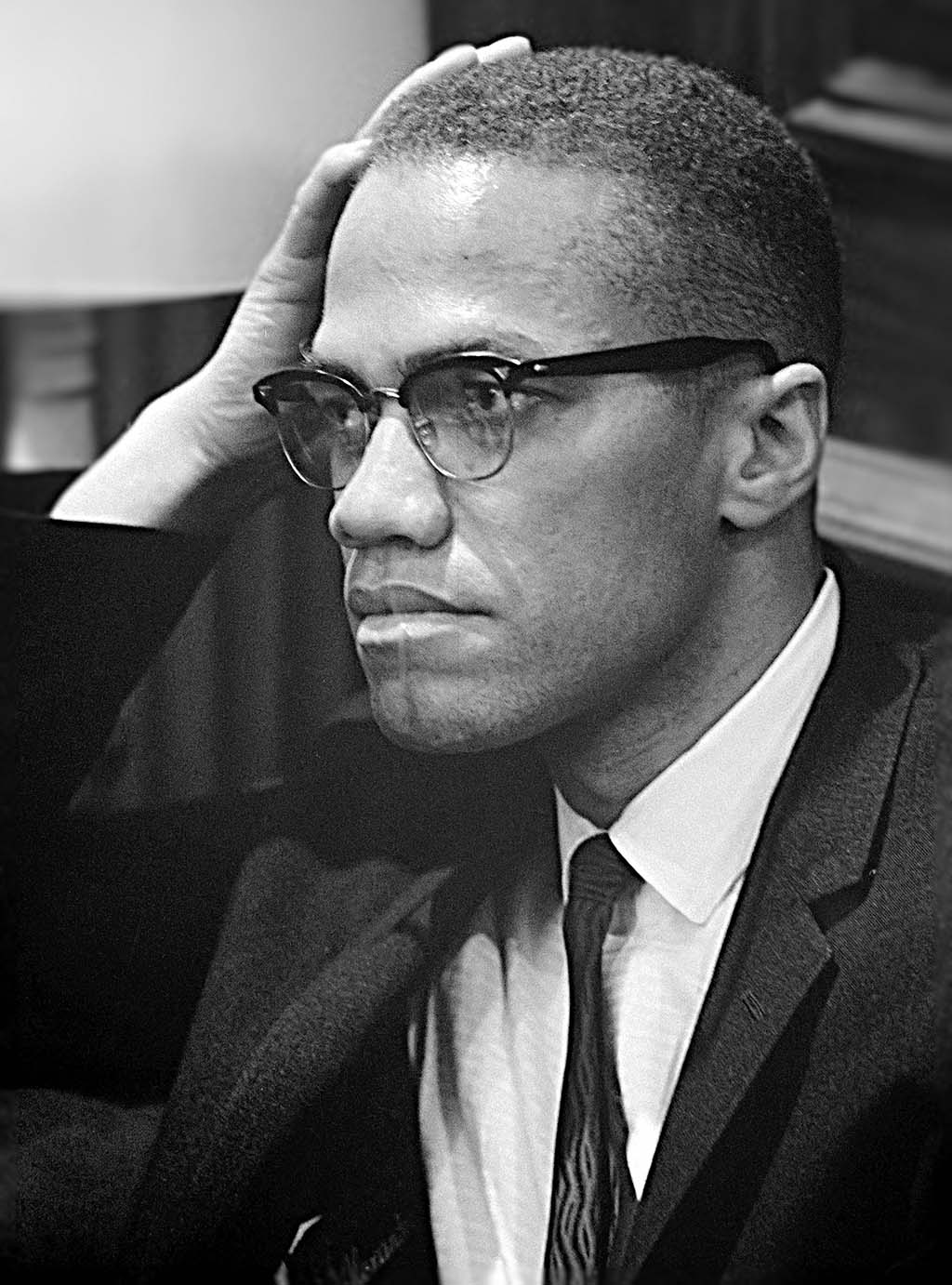The Role of the Nation of Islam in the Civil Rights Movement
By Ashley Adams, North Carolina Department of Natural and Cultural Resources, 2020
What do you know about Malcolm X? Many people don't know that he came to North Carolina to speak during the 1960s. As you read this article, think about how people around the state felt about him coming to North Carolina. How might race, religion, gender, class, or other background factors have shaped how individuals or groups felt about Malcolm X’s visit?
Christian pastors and Jewish rabbis and their communities were leaders in the Civil Rights Movement. And many people wanted to align their activism and religious beliefs. Yet, movement participants represented many faiths and religions. And use of non-violent tactics became an important and effective strategy. Non-violent approaches included direct action tactics such as peaceful protest and marches, boycotts, and sit-ins. And these tactics were often used to work within existing cultural and legal structures to break down racism and segregation.
But non-violent activism was not the only strategy. Some people supported a more radical approach to achieving freedom from oppression and liberation. This more radical approach included the ideas of black nationalism and self-defense. And in the 1960s, then less well known religious groups gained attention for vocalizing the need for liberation and self-defense in the movement to end segregation and oppression. During this period Islam attracted a large number of African Americans.
The Nation of Islam (NOI) offered many African Americans a new religious community. Wallace D. Fard Muhammad created the NOI on July 4, 1930 in Detroit, Michigan. NOI leaders advocated Black Nationalism. This included calls for Black unity and sometimes a separate Black nation. Both of these ideas appealed to many African Americans. Elijah Muhammad stepped in as the leader of the Nation of Islam in 1934. He offered African Americans an alternative version of freedom and equality.
One of the people Muhammad’s messages appealed to was Malcolm Little. In the early 1950s, Little joined the Nation of Islam. He changed his name to Malcolm X and moved up the ranks in the NOI. Soon, he became one of the most recognizable leaders of what is now known as the Black Power Movement. In the late 1950s and 1960s, Malcolm X and the NOI's ideals gained popularity. During this period, Malcolm X accepted invitations to speak on many local and national stages. African Americans flocked to see him speak across the United States.
In February 1963, Nation of Islam minister Malcolm X made his first stop in North Carolina. After visiting South Carolina, he made a trip to Charlotte. First, he spoke at the historically black college, Johnson C. Smith University (JCSU). He also delivered a speech to the Hi-Fi Club in the Washington Heights neighborhood in the West End of Charlotte. A member of the JCSU Theology department helped Malcolm X get the opportunity to speak on campus. His visit drew almost 500 people to the school’s auditorium. His remarks during the public lecture made waves. Malcolm X stated that the integration of races was not the way. He also told the audience that the “white man is on the decline, and one day the Negro will stand on top of the hill.” University spokesperson Moses S. Belton said college officials invited Malcolm X to speak because times were changing. He explained that the school felt that all “avenues of thought should be offered to students.”
There were many reactions to Malcolm X’s first visit to North Carolina. At the national level, the FBI had an eye trained on Malcolm X and monitored his activities, including his time in Charlotte. Regional newspapers printed strong criticisms. For example, the Norfolk Guide and Journal referred to the Nation of Islam and Malcolm X’s followers as a cult advocating overthrow of the white race. There were even calls for Congress to investigate the Nation of Islam. Some people felt that the Nation of Islam’s messages were “anti-white, anti-Christian and anti-American.” These critics included other African Americans. Yet, there were a range of reactions. On the other side, people felt the NOI's response was appropriate. They argued that the racism and oppression Black people faced around the world required a strong response, especially in the U.S.
Although he was not well-received in Charlotte, Malcolm X returned to North Carolina. On April 18, 1963, he visited Durham. The city was becoming a destination for African American civil rights activists. And Durham’s African American Muslim population increased significantly during this time. In fact, Islamic community members built the city's first temple, Muhammad’s Mosque of Islam, a year before Malcolm X visited.

That evening, McKissick said that he and Malcolm X were not debating. He said they were “talking about black folk, and what it meant to be involved” in gaining rights for black people, no matter how it looked. At the time, they differed somewhat in their approach to achieving racial equality for blacks, with McKissick advocating for integration and Malcolm X for separation. That evening Malcolm X also made an impression on the citizens of Durham. He insisted that since McKissick was a leader in the city he should be introduced first. He also encouraged the security guards from the NOI, known as the Fruit of Islam, to not separate the audience by gender and race, which was normal practice at the time.
The next day Malcolm X made his way to Chapel Hill for a speaking event at UNC. It was organized by UNC student and writer at the school newspaper The Daily Tarheel Henry May and the Carolina Forum. The event was planned for Carroll Hall. But it had to be moved at the last minute to Memorial Hall when nearly 1,600 people showed up.
Although many of Malcolm X’s views caused controversy, his presence in Charlotte, Durham, and Chapel Hill was significant. It helped expose people to new ideas during one of the most critical times for African Americans. In fact, his presence in Durham caused so much controversy that Floyd McKissick’s daughter Jocelyn who was also a student at NCC was suspended from school because she drove him in her car to Page’s Auditorium. In Charlotte, the school administration of JCSU put out a lengthy statement saying: “The Black Muslims and their representatives do not represent the feelings, the thoughts or the aspirations of the Negro people. In Charlotte, the Negro wants nothing more to take his rightful place as a contributor to the general good and welfare of the community. He asks for dignity. He asks for equal opportunity. In the finest traditions of his religion, the Negro believes in loving his neighbor.” The staff of JCSU held the beliefs of many Civil Rights leaders of racial equality, while Malcolm X pushed black economic independence in a way that was not as widely popular or recognized amongst the public.
Malcolm X eventually left the NOI. He also changed his name to El-Hajj Malik El-Shabazz in 1964 after a pilgrimage to Mecca in Saudi Arabia. Mecca is considered the holiest city for the Islamic faith. Unfortunately, he was assassinated in Harlem, New York at the Audubon Ballroom on February 21, 1965. His legacy, although controversial, continues to lives on.
Concluding questions:
- Are there any potential problems or dangers that could arise by allowing all ideas and perspectives to be voiced on a sensitive subject or issue?
- Are you aware of any topics or speakers that have raised questions about limits on free speech or what's acceptable on college campuses?
References:
“Crowds Hear Muslim Debate Candidate Running for Mayor,” The Carolina Times, April 27, 1963.https://blogs.lib.unc.edu/ncm/2017/06/24/malcolm-x-debates-floyd-mckissick-in-1963/ (Accessed May 3, 2022).
“FBI Keeping Eye on Malcolm X’s Visit To Charlotte: City Has Muslim Temple,” Norfolk Journal and Guide, February 2, 1963. https://www.heraldsun.com/news/local/counties/durham-county/article21095.... (Accessed January 8, 2020).
Image Credit:
“Crowds Hear Muslim Debate Candidate Running for Mayor,” The Carolina Times, April 27, 1963. https://blogs.lib.unc.edu/ncm/index.php/2017/06/24/malcolm-x-debates-flo... (Accessed January 7, 2021).
